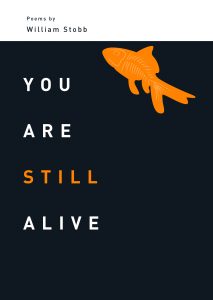Book Review
The poems in You Are Still Alive by William Stobb are digressive and conversational, where detailed descriptions of the everyday and pop-cultural abound. Rather than this dissipating energy, however, Stobb uses the material to perform serious, nearly Buddhist thinking. Infused with elegiac hope, the poems hover on the cusp of an enlightened release of all worldly things—and a deep reluctance to give them up. Stobb proves that the profound exists in surprising places and that we may access thoughtfulness even when taking part in thoughtless tasks.
The focus of Stobb’s poems range from science fiction movies to childhood memories to meditations on passersby. Many of these poems catalog deeply ordinary things—places, people, exchanges between people—and arrange them to create a thought-landscape the speaker navigates. In “Capitol Street Pulse,” a scene from a coffee shop cascades in details:
At the next table, three engineering students use their big brains to
sketch the circuitry of sunglasses that will project holographic
movie clips in the air around our heads.
We’ll buy scenes like ringtones and illuminate ourselves with
Hollywood. I’d buy the guy holding his baby in the rain shouting
Good luck exploring the infinite abyss!
The pleasure in the catalog and the tone of the writing points out what is strange and slightly ridiculous about our shared world without discounting it. The speaker suggests, sure, those sunglasses sound ridiculous, but what isn’t? The everyday in all its strangeness creates a setting for a mind coming to terms with itself.
Science fiction is important to this collection as a catalyst for considering the “infinite abyss,” only rather than outer space it is the interior that is explored. In “Doom,” the poem jumps from Strauss’s Zarathustra to the video game Doom to a frank and dark conversation with a friend—then Stanley Kubrick’s 2001: A Space Odyssey, then Victor Von Doom. The backdrop is insecure and can be overturned as quickly as a movie or video game might kill off a character or attack a hero:
and even though we were on a bright patio at a sushi place in Chicago, I felt a
foreboding sense, as in a horror movie, that a spear would be thrust from
the ground up through my body and out my mouth leaving me gagging
blood while everyone ran, screaming.
The threat here is the speaker’s imagination—his constant thinking in which he finds himself looped: “One positive thing about death might be/the end of having to think.”
The world of this speaker (which is our shared world) is falling apart—climate crisis, crisis of democracy and leadership, crisis of police violence. With that acknowledgement, the crisis turns private—how can Stobb live in this bleak world? Kubrick’s 2001 returns in “Poem for the Very Beginning” and acts as an anchor for the psychological trauma of grasping how self-destructive humans are and the speaker’s status in that cycle. But Stobb’s vision isn’t pitch-black. He writes:
The best part is the beginning, where there’s some radiance in the black like
there might be a small fire just to the left of the world, and the strings
begin to prepare.
He offers radiance, even if it is the wary kind. In “Freedom,” near the end of the collection, it’s not political or socioeconomic freedom being considered, but spiritual: “the precious glimmer of /freedom can make you giggle and cry in an earnest way if wonder is still/available to you.”
Ultimately, Stobb affirms the value of the book’s nominal proposition. Yes, You Are Still Alive, and the challenge to the poems’ speaker is to make peace with that. Part of that journey is admitting he desires living. In “During a Panic Attack, I Watch a Buddhist Documentary,” Stobb writes:
I’m afraid
I wanted this
living like a child
wants every form of sugar.
It might be complicated to be alive in this crumbling world, but this speaker can’t give up on it. The final poem, “Nocturne,” is a moving culmination of the journey of thought we’ve been on. This frank, “dark” speaker is also filled with light—or desperately wants to be. Mimicking a child’s picture book, he says goodnight: “Good night cloud island over desert valley./Good night tennis executive/…/Good night beer. I’m not ashamed of us.” The life that the speaker wants like sugar, is still one he faces in fear and desire, “This life is all I can remember/and I’m afraid to let it go.”
There’s an invitation in You Are Still Alive to go on your own journey of thinking, to see the details and detritus of the world crumbling around us as material for a self-awakening. There’s an extensive “Notes” section that details the inspiration—literary text, location, or movie—for many of the poems, evidence not only of how Stobb’s poetics are rooted in the real world, but are engaged in a tentative embrace of it.
About the Reviewer
Emily Wolahan lives in San Francisco. She is the author of the poetry collection Hinge (National Poetry Review Press, 2015). Her poetry has appeared in the Boston Review, the Georgia Review, Oversound, and other publications. Her prose can be found in Arts & Letters, Among Margins (Ricochet Editions, 2016), and The New Inquiry. She has won the Loraine Williams Poetry Prize and the Unclassifiables Contest from Arts & Lettters. She has received fellowships from the Headlands Center of the Arts and Vermont Studio Center, and is a poetry editor at Tinderbox Poetry Journal.
